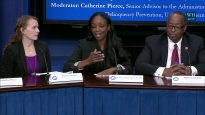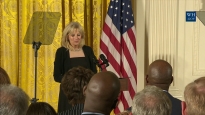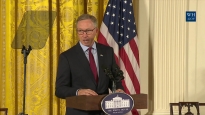President Obama and President Hollande Visit Monticello
February 10, 2014 | 8:42 | Public Domain
President Obama and President Hollande of France deliver remarks during a tour of Monticello. As the residence of Thomas Jefferson, one of the United States’ earliest envoys to France, Monticello reflects Jefferson’s affection for the people of France, the long-standing relations between our two democracies, and the shared values we hold dear: life, liberty, and the pursuit of happiness.
Remarks by President Obama and President Hollande of France After Touring Thomas Jefferson's Monticello
Monticello
Charlottesville, Virginia
5:32 P.M. EST
PRESIDENT OBAMA: Well, this has been a wonderful visit. And I want to thank François for joining us here today. I thought this was an appropriate way to start the state visit because what it signifies is the incredible history between the United States and France.
As one of our Founding Fathers, the person who drafted our Declaration of Independence, somebody who not only was an extraordinary political leader but also one of our great scientific and cultural leaders, Thomas Jefferson represents what’s best in America. But as we see as we travel through his home, what he also represents is the incredible bond and the incredible gifts that France gave to the United States, because he was a Francophile through and through.
He drew inspiration from the Enlightenment ideas that had been developed in France and throughout Europe, but he also drew from the arts, from the architecture, from the writings, from the culture and from the cuisine of France. And so, in this sense, this home represents the bonds that helped lead to the American Revolution, helped to influence the French Revolution, figures like Lafayette, who played such a central role in our own independence -- all this is signified here at Monticello.
And our hope in starting our visit this way is that, just as we can extend back through generations to see the links between the United States and France, tomorrow we'll have an opportunity to talk about not only our current bonds and alliance but also ways that we can strengthen our cooperation in the future.
And of course, this house also represents the complicated history of the United States. We just visited downstairs where we know the slaves helped to build this magnificent structure, and the complex relations that Jefferson, the drafter of the Declaration of Independence, had to slavery. And it’s a reminder for both of us that we are going to continue to fight on behalf of the rights of all peoples -- something that I know France has always been committed to, and we are committed to as well.
And I'm looking forward to talking about issues of human dignity and human rights not just in our own countries, but around the world as well.
So, Mr. President, welcome to Monticello, and we look forward to continuing our conversation tomorrow.
PRESIDENT HOLLANDE: (As interpreted.) I would like to thank especially President Obama for having invited me to this house. This is Thomas Jefferson’s house, which means that this was a man who understood -- met the secretary of Enlightenment, and he wanted to represent this life throughout this house. You can see life everywhere. You can see it the objects, in the refinement of the objects, and its architecture.
Why is this house a symbol? Because here Lafayette was welcomed. Together, Lafayette and Jefferson imagined something that seemed impossible -- mainly American independence and the rights of -- human rights and the rights of the citizen. Thomas Jefferson drafted the Declaration of Independence, and Lafayette was also involved in drafting the Rights of the Citizen, and they met together in this house.
There is something quite unique about Jefferson in the fact that he been ambassador of the United States to France before becoming U.S. President. I do believe that is the only American President that had that experience. And he was U.S. ambassador to France at the time of the French Revolution, and he departed from France in August of 1789, which means after the 14th of July with the taking of the Bastille. He thought he had seen enough and that he could go back home. And then of course, he was involved in the governance of the United States before becoming President. And then Jefferson purchased Louisiana from Napoleon. And today we are not demanding anything. (Laughter.)
PRESIDENT OBAMA: It was a good bargain, though. (Laughter.)
PRESIDENT HOLLANDE: (As interpreted.) I also wish to confirm that this bond that unites us with Jefferson, that these bonds are sustained over time, because he represents values and principles. Freedom, human dignity, rights -- these are the values to which we are continuing to fight around the world, the United States and France. We were allies in the time of Jefferson and Lafayette. We are still allies today. We were friends in the time of Jefferson and Lafayette, and we will remain friends forever.
Thank you.
PRESIDENT OBAMA: Thank you very much.
END
5:41 P.M. EST
|
November 15, 2016
|
November 15, 2016
|
November 14, 2016
|
November 14, 2016
|
|
November 14, 2016
|
November 14, 2016
|
November 14, 2016
|
November 14, 2016
|
- &lsaquo previous
- …
- 8
- 9
- 10
- 11
- 12
- 13
- 14
- 15
- 16
- …
- next &rsaquo







